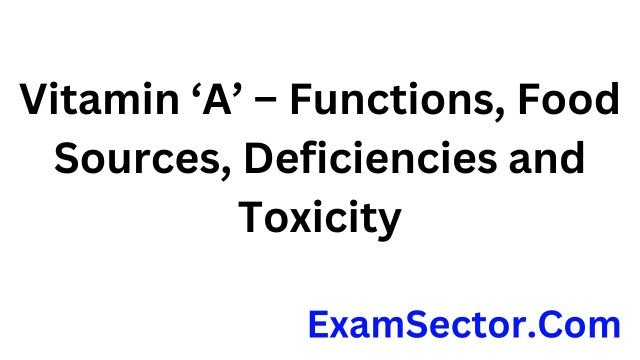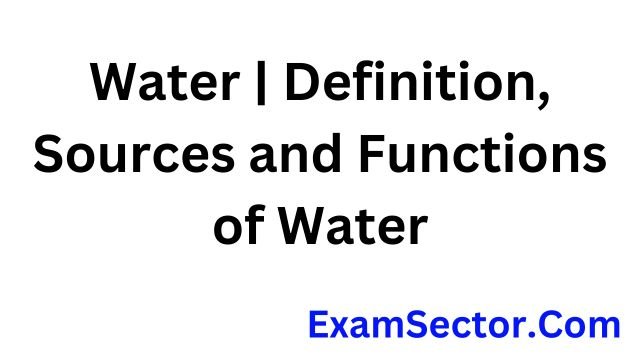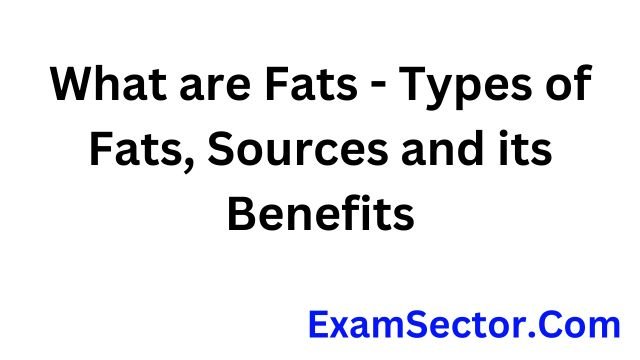Vitamin C (Ascorbic Acid) – Uses, Side Effects, And More Vitamin ‘C’ (Ascorbic acid) Vitamin C is also known as Ascorbic acid. Vitamin C came into light when treatment and reasons for scurvy disease were discovered. These are white shaped crystals and are soluble in water. They are readily oxidized, especially in the presence of…
Author: examsectoreng
Vitamin ‘K’ – Functions, Food Sources, Deficiencies and Toxicity
Vitamin ‘K’ – Functions, Food Sources, Deficiencies and Toxicity Vitamin ‘K’ The presence of vitamin K was first reported by Dr. Dam. In 1934, experiments on chicken led to the knowledge that vitamin K helps in blood clotting. This vitamin is bleeding– resistant vitamin. Types of vitamin K – Vitamin K is mainly of 2…
Vitamin E – Functions, Food Sources, Deficiencies and Toxicity
Vitamin E – Functions, Food Sources, Deficiencies and Toxicity Vitamin E— In 1922 Evans and Bishop experimented on mice and reported that a fat-soluble element is necessary for reproduction in mice. This element was named as vitamin ‘E” which is helpful in production of offspring. This vitamin is also known as infertility impeding vitamin. According to…
Vitamin D – Functions, Food Sources, Deficiencies and Toxicity
Vitamin D – Functions, Food Sources, Deficiencies and Toxicity Vitamin ‘D’— Vitamin D is an important fat-soluble vitamin. This vitamin works against bone deformities. Types of vitamin D— Rickets resistant substances and sterol compounds are combined together to form vitamin D.Vitamin D is of two main types Vitamin D2 — It is called Ergosterol or…
Vitamin ‘A’ – Functions, Food Sources, Deficiencies and Toxicity
Vitamin ‘A’ – Functions, Food Sources, Deficiencies and Toxicity Vitamin ‘A’ vitamin A is a fat-soluble vitamin. Vitamin A is present only in animal-based food products. In plantbased food products, carotenoids are present which get converted into vitamin A in the body. Carotenoids are thus also known as pro-vitamin A. Types of vitamin ‘A’ Vitamin…
Vitamin | Definition, History of Vitamins , Classification and Function of Vitamins
Vitamin | Definition, History of Vitamins , Classification and Function of Vitamins What are Vitamins — vitamins are active organic elements which are important for good health of the body. Though these are required in minute quantities they are important for growth, development, vivacity and liveliness. History of Vitamins — Before 19th century, scientists knew…
Water | Definition, Sources and Functions of Water
Water | Definition, Sources and Functions of Water Water — Water is very important for life. After oxygen, water is an essential requirement for survival of life. Water is formed by the chemical combination of hydrogen and oxygen. The chemical formula of water is H2 0. It is an inorganic compound. Physical organization— Water makes…
What is Energy ?
What is Energy ? Energy— Carbohydrate, protein and fat are main energy producing food substances. Oxygenationof these provides energy. This energy is used for various functions and processes of the body. Energy is required for voluntary activities like running, walking, sleeping, cooking etc. and for involuntary activities like breathing, blood circulation, heart beating, etc. Calorie…
What are Protein ? | Definition, Structure, & Classification
What are Protein ? | Definition, Structure, & Classification What are Protein ?— Protein is essential for survival, therefore, it is the most important element of all. That is why protein is called as ‘body-building unit’. Protein is derived from Greek word ‘proteios’, meaning “primary”, “in the lead”, or “standing in front ‘. A Dutch…
What are Fats – Types of Fats, Sources and its Benefits
What are Fats – Types of Fats, Sources and its Benefits What are Fats — Fats are a concentrated source of energy. Fat is an organic compound which is insoluble in water but soluble in organic solvents such as chloroform, benzene, ether, etc. These are smooth to touch. Chemical Formation of Fats — Carbon, hydrogen…









